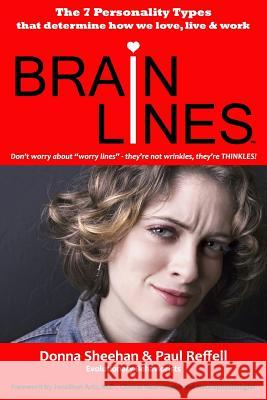BrainLines: The 7 Personality Types that determine how we love, live and work » książka
BrainLines: The 7 Personality Types that determine how we love, live and work
ISBN-13: 9781490585932 / Angielski / Miękka / 2013 / 164 str.
Years ago, I noticed my first wrinkles. My face was a physical record of a life spent in the California sun. Disturbing, yes, but what could I do to make myself feel better about them? My solution was to draw a self-portrait accentuating every wrinkle on my face. While drawing my forehead, I became curious as to why the 'frown lines' between my eyebrows were of different lengths. I saw a deep, long vertical line on one side and another deep vertical line, only half as long, on the other. Why were they different from each other? Why were they so much deeper than my other wrinkles? From that moment on, I was fascinated by these wrinkles. Enthusiastically, I plunged into research and found that there were multiple formations. Some people, even the elderly, had no pattern of lines. Some children, even toddlers, had deep lines. Today I call them BrainLines. Comparing my friends' BrainLines with what I knew of them, I began to see relationships between the differences in their lives and their BrainLines patterns. I began to find similar personality traits in people with similar 'readings.' During the 1960's and '70's, the scientific research into left and right brain hemisphere functions and how they influenced behavior became popularized. I began to wonder if there was a correlation between BrainLines and the personality. When I started thinking in terms of left-brain and right-brain processes, as defined by researchers, they became an effective way to describe the behavior patterns of my friends and myself. I had stumbled across the BrainLines connection I noticed that my 'right-brained' friends had a pronounced vertical frown line on the left-hand side, while my more 'left-brained' friends had one on the opposite side. So, my life began to change as I spent more and more time interviewing people. I would read people's BrainLines and ask them pertinent questions about their lives and their perceptions. Soon, I could tell them their basic personality traits. The accuracy of these basic readings made people think that I was psychic. I felt I was really on to something, a method of reading everyone I met, even strangers on the street. Eventually, it became apparent that there were seven basic personality types that were discernible from BrainLines patterns. By combining this knowledge with the solid scientific research into left- and right-brained behavior traits, I realized I had found a personality identification tool. BrainLines has developed into an extremely efficient, emotionally satisfying method of helping the average person relate to their inner and outer worlds. Through the years of research and observation, I was encouraged by the example of another pioneer in the typology field, Katharine Briggs. Without formal training in psychology, she developed a system which later became the respected and widely-used Myers-Briggs Type Indicator. Her courage and ability to fill a human need were an inspiration to me. I have been told by Dr. Randy Thornhill, of University of New Mexico, that the development of a system in isolation, free from the academic world, gives it strong accreditation. Some skeptics have said they find any kind of personality typing restrictive, that I'm trying to fit people into little boxes. A BrainLines reading is not a box, but a launching pad for the preferences and talents with which we are all born. By looking at a person's face I feel universally connected with a stranger. With my new sense of knowing my own strengths and weaknesses, I finally have some insight into the old questions, "Who am I?" and "Who are you?" Discovering BrainLines has been a momentous addition to my life. But, were it not for my partner and writer, Paul Reffell, BrainLines would not be recorded. He has played a major role in the development of the BrainLines system. It gives us great pleasure to now share this gift with you and may it give you the comfort and insight it has given both of us. Donna Sheehan
Zawartość książki może nie spełniać oczekiwań – reklamacje nie obejmują treści, która mogła nie być redakcyjnie ani merytorycznie opracowana.











